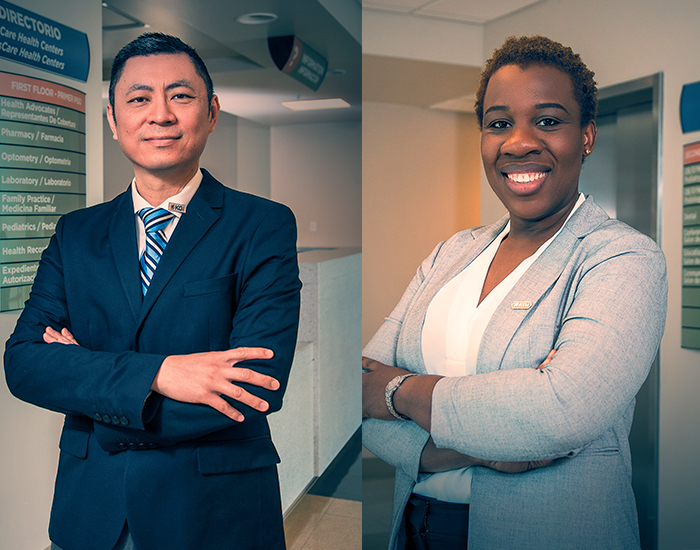This feature story originally appeared in the KGI Annual Report, which is linked here.
Together, John Nguyen and Emma Nkwam work to ensure that QueensCare Health Centers provide high-quality care to underserved patients in Los Angeles. The two have also been colleagues before—at KGI, where both completed the Postdoctoral Professional Masters (PPM) in Bioscience Management program in 2018.
“I think we work better as a team because we already did this at KGI,” says Nkwam, who holds the newly created role of quality manager at QueensCare Health Centers and previously earned a PhD in health and life sciences at the University of the West of England. “We know how to deliver on deadlines and are serious minded.”
The program they undertook was designed for students with a doctoral degree in a science or engineering discipline and a desire to pursue management positions or entrepreneurial ventures related to the applied life sciences industry.
“John and Emma were both able to learn to speak the language of the business and the regulatory aspects, neither of which they had encountered before in their training,” says KGI Professor James Sterling, a cofounder and former director of the PPM program who continues to advise students.
Coming into the PPM program, Nkwam was interested in working for a biotechnology company. Nguyen, a physician with an obstetrics and gynecology practice, wanted to learn how to turn his idea for a medical device—a technology to detect preterm labor—into a tangible product.
Nguyen was the first to shift direction: Months before graduating from the PPM program, he became the chief medical officer for QueensCare Health Centers. He had hoped for an executive-level position someday but never expected to obtain one so soon.
“The program really prepared me for interviews. I learned to make my presentation clear, concise, and thorough.”
“I think I’m more assertive now. I can communicate better. And I carry myself with more confidence than ever before,” says Nguyen.
As chief medical officer, Nguyen now spends more time in meetings than patient care. As a result, he considers the organizational behavior course he took at KGI particularly beneficial.
“I apply everything I learned at KGI,” he adds. “I’m more analytical now. I look not just at clinical data, but also market data. And I look at pricing and do comparisons when we order drugs.”
Nguyen also turned to KGI for assistance at his new organization. Last spring, he brought in several Master of Business and Science (MBS) students on a part-time basis and encouraged Nkwam to join him full-time after graduation.
New to healthcare administration, Nkwam finds herself drawing on the communication, relationship-building, and data-analysis skills she developed through the PPM program.
“With a PhD, you think you don’t have more to learn. But even with all my education, every class I took taught me something new. Learning to work in teams, which we did all the time at KGI, was one of the biggest benefits,” says Nkwam. “I also had no background in business, entrepreneurship, or analytics before.”
Now Nkwam is responsible for tracking and analyzing extensive quality measures. Enjoying her work, she is uncertain whether she will move into the biotechnology industry after all.
“If I do, it will be in a very different way. Instead of drug discovery or strategic planning, it will involve peer-to-peer communication, medical affairs, or health outcomes research,” explains Nkwam.
In the meantime, she is applying her abilities to an additional project outside work: Collaborating with Nguyen to develop the medical device that first led him to the PPM program.
“Of course I recruited someone from KGI to help with the medical device,” says Nguyen, who has also received guidance from KGI President Sheldon Schuster and assistance from current MBS students Eric Benjamins and Alex Hilbert. “I wouldn’t trust anyone else!”
